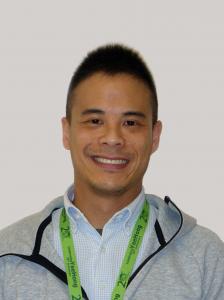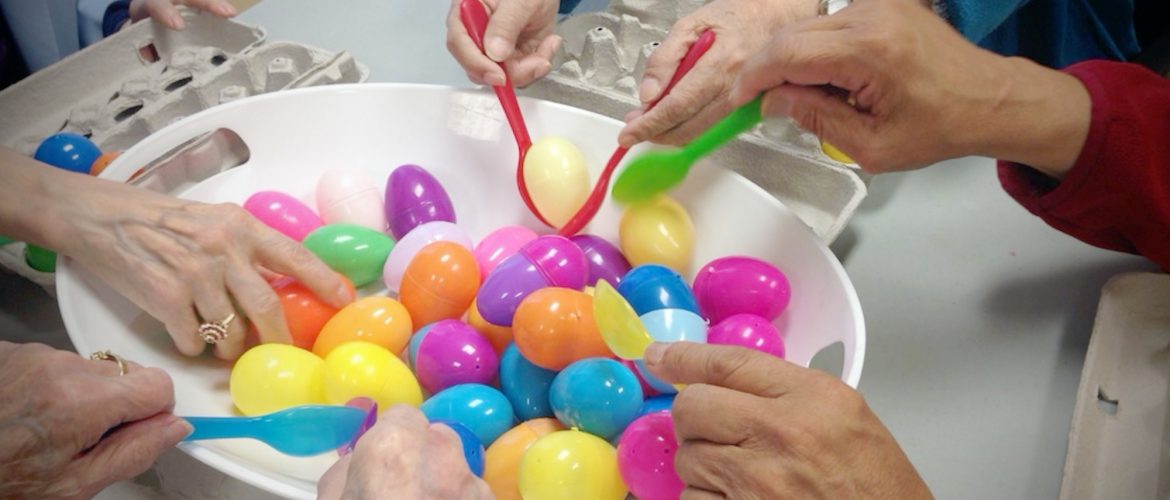Who says playing is just for children? Adults can benefit from a dose of creativity and fun as well. That’s the philosophy behind Play Intervention for Dementia (PID), a strategy developed by University of Toronto professor Ka Tat Tsang in collaboration with the Yee Hong Centre for Geriatric Care in Toronto to engage seniors living with cognitive decline. With support from the Baycrest-led Centre for Aging + Brain Health Innovation (CABHI), Yee Hong is expanding the intervention’s reach and delivering training sessions to those that see the effects of dementia everyday: caregivers.

Social worker William Leung
“The play process is very versatile; there’s so many different ways you can use play to engage seniors,” says William Leung, a social worker and senior coordinator at Yee Hong, adding that PID builds on professor Tsang’s Strategies & Skills Learning Development intervention (SSLD).
“All human behaviour in the SSLD system is seen as driven by an unmet need,” William explains. “So regardless if this behaviour is appropriate or not to our eyes, the person exhibiting this behaviour must have some form of unmet need, which is behind what’s motivating the behaviour.”
He uses the example of a senior with dementia sleeping during a day program. “That person might be sleeping because they’re feeling bored.”
The start of PID
Professor Tsang and Adult Day Program staff at Yee Hong had an inkling that integrating the play process would stimulate the seniors in the day program, addressing some of those unmet needs. They initiated a ‘Toy Day,’ where they brought in a number of toys and games (everything from stress balls to Jenga blocks) for the seniors to engage with.
“When we said toys they thought, ‘Oh, this is for children. Are you treating our seniors like children?’ No – anyone can have fun. The first step was actually to get caregivers and the seniors to understand that playfulness is not exclusive to children – each of us should be able to have fun when we’re doing things.”
Initially, the play time was completely unstructured; there were no rules or instructions. “It’s not like you put a Monopoly board game and they follow the rules. It was a very freestyle way where we provided different objects and seniors actually had to eventually create their own rules and they started to interact with people beside them.”
‘Toy Day’ provided a lot of insight and further confirmed the potential of PID. Yee Hong decided to run PID for one year during its adult day program and received overwhelmingly positive feedback from clients and caregivers alike. “Some of the things we witnessed and observed were spectacular. It was very minute.”
For example, Adult Day Program staff started noticing an increase in talking amongst the seniors and a significant drop in washroom calls. “A lot of our evidence is anecdotal – it’s all reported from the family members that we’re seeing,” he adds.
So where do caregivers come into this story? “Our wish is to postpone the seniors’ need to move into long-term care as much as we can,” William explains. “We want them to stay in the community and live the life they live. But the caregivers are crucial because if the caregivers fall apart, then there’s often no choice.”
William applied for CABHI’s Spark program, which is designed to nurture early-stage ideas from point-of-care clinicians. CABHI provides up to $50,000 in financial support, plus guidance and feedback opportunities.
“The whole CABHI team has been very supportive and responsive in every way,” says William. “Thanks to the financial support from CABHI, we’re able to expand this intervention to caregivers – which is something we’ve been wanting to do all along.”
A caregiver’s perspective
Wendy Wu, who cared for a family member with dementia, has benefited from this first hand. The caregiver says the PID training was “eye-opening,” offering her a valuable strategy she could use to engage her family member.

Wendy Wu
“All of us went home and felt the impact of the training,” she adds. “We sort of lost track of the person that was buried inside the body that they don’t necessarily know how to express anymore. We have to sort of go back to the way we knew the person; we know what they like and what they didn’t like. So we kind of use that to engage them.”
Wendy says PID also helped address physical issues. “I started using some of the PID principles with my family member after dinner. It was helpful because with dementia patients, their physical abilities can recede. So I learned to pay attention to that as well. And how to bring something simple and fun that stimulates engagement. So that was very beneficial in the sense that we were now able to have a little more fun rather than being stressed all the time,” shares Wendy, adding the technique has reminded her of the importance of mental health and engagement as well.
CABHI’s support is helping William deliver PID training sessions to caregivers in different languages (English, Cantonese and Mandarin). With the feedback from participants, William and his team are making adjustments to a PID workbook for caregivers that will have an even wider reach.
“The beauty of PID is we are training people to look at play not as a set of rules,” William says. “We’re training caregivers that they can take any item in their home – it could be as simple as an elastic band that’s right in front of them – and make it into a play aspect that’s used to engage the senior.”
Watch the video below to see PID in action:


